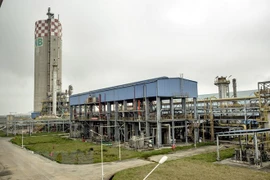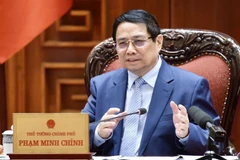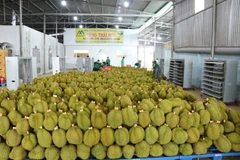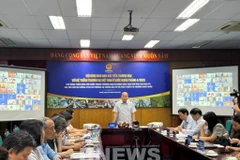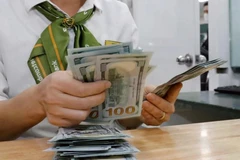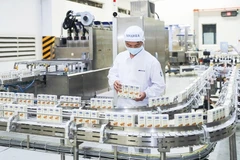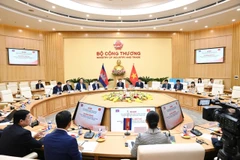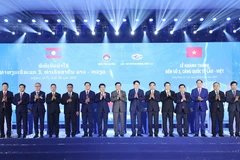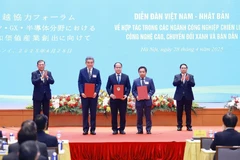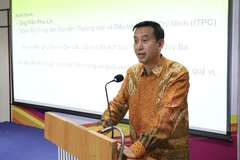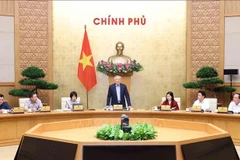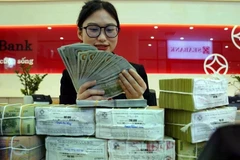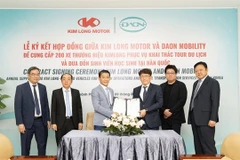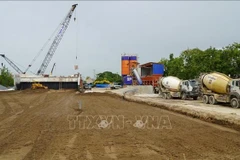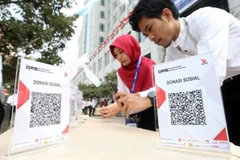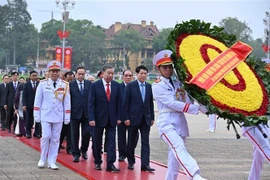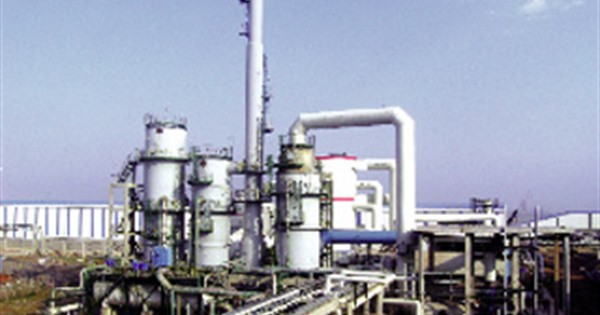 DAP 1 Hai Phong fertiliser plant. After suffering losses in the past, the plant reported profits of 195.5 billion VND in 2018. (Source: vinachem.com.vn)
DAP 1 Hai Phong fertiliser plant. After suffering losses in the past, the plant reported profits of 195.5 billion VND in 2018. (Source: vinachem.com.vn)Hanoi (VNS/VNA) - The Ministry ofIndustry and Trade (MoIT) has reported some positive signs in the handlingof 12 major State-owned projects that have long reported losses, as some havemanaged to resume operations after suspensions or even record profits.
The information was released at a workingsession chaired by Deputy Prime Minister Vuong Dinh Hue with representatives ofthe ministry and the projects’ investors in Hanoi on March 27.
A report from the ministry showed that two ofthe projects managed to recover and report profits in 2018: DAP 1 Hai Phongfertiliser plant (195.5 billion VND or 8.4 million USD) and Vietnam– ChinaSteel Plant (469 billion VND).
Four other projects have gradually managed tostabilise production and reduce losses. In the first two months of the year, HaBac fertiliser plant reduced its losses by 30.6 billion VND compared with thesame period last year. DAP 2 Lao Cai fertiliser plant reduced losses by 10.1billion VND and Ninh Binh fertiliser plant by 44.5 billion VND.
Two projects resumed operations including Dinh Vupolyester fiber factory (PVTex) and Quang Ngai ethanol plant. Binh Phuocethanol plant also resolved issues and appears to be ready to restartcommercial operations.
Nguyen Phu Cuong, Chairman of the Vietnam NationalChemical Group (Vinachem), proposed removing DAP 1 Hai Phong eertiliserplant from the list of loss-making projects as has posted three years ofstable operations and met the MoIT’s criteria.
The ministry’s five criteria for moving projectsoff the list include finalising projects, problems and disputes withcontractors in engineering-procurement-construction (EPC) contracts; stableoperation and at least one profitable year. In addition, they must not haveoverdue debt continuously for a minimum period of three years at creditinstitutions and must comply with laws on tax obligations and budgetremittances. Finally, the projects must complete the tasks set out in theaction plan to handle weakness.
Deputy PM Hue agreed with the Vinachem’sproposal and asked MoIT to cooperate with the firm to remove the plant from thelist. This could help the project better mobilise capital.
Nguyen Dinh Phuc, General Director of the Vietnam–China Steel Plant, said the project has not completed tax and fee duties and iscontinuing to face difficulties in the first months of the year. Nevertheless,he expects the plant to be removed from the list soon.
EPC disputes are a common sticking point for theprojects. In most cases, contractors completed their work behind schedule,amassing further costs and flooding the projects with debt.
The Vietnam Oil and Gas Group (PetroVietnam) wasreported to have completely resolved legal disputes with contractors at PVTex,creating favourable conditions to restructure PVTex.
Le Manh Hung, PetroVietnam’s deputy generaldirector, said PVTex has operated its 10 fibre production lines stably,bringing in profits to offset production costs. It has worked with banks toarrange capital to restart the rest of the plant this year.
However, resolving legal disputes with EPCcontractors has not been easy for the remaining projects, especially Ninh Binhfertiliser plant and Thai Nguyen Iron and Steel plant.
Phuc said the Vietnam– China Steel plant wasunable to negotiate with its contractor and was awaiting instruction from theMinistry of Justice to resolve the issue.
Deputy Minister of Justice Phan Chi Hieu saidthe company had to clarify issues with the contractor to ensure benefits forthe project.
Deputy PM Hue said it was necessary to resolvethe difficulties before divesting State capital from the projects.
The Deputy PM said that if a project found itdifficult to negotiate with an EPC contractor, they could involve the Ministryof Justice.-VNS/VNA


